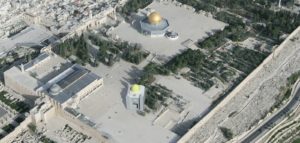1050 The Temple Mount
In a letter from the yeshiva (Ge’on Ya’agov) of Jerusalem to the communities in the diaspora [evidently those in Egypt], written in the middle of the eleventh century, we find the passage: ‘And from our God there befell His mercy upon us before the kingdom of Ishmael; at the time when their power expanded and they the Holy Land from the hands of Edom, and came to Jerusalem, there were people from the Children of Israel with them; they showed them the spot of the temple and they settled with them until this very day…’
In these latter sources, we not only find the confirmation of the settlement of Jews in Jerusalem shortly after the conquest, but also an interesting point found also in the Muslim traditions on the participation of the Jews in disposing of the refuse on the Temple Mount and the appointment of a number of Jews to be responsible for its cleanliness. The fragment of the letter quoted above and the fragment of the Jewish chronicle also confirm the episode of the Jews assisting in uncovering the rock. It is worth adding the words of the Jewish chronicle on how the cleaning of the Temple Mount proceeded:
‘Taking part were all the Muslims in the city and in the district and participating with them were group of Jews; afterwards they were ordered to evacuate the rubbish from the sanctuary and to clean it; and ‘Umar watched them all the time. Whenever a remnant was revealed, he would ask the elders of the Jews about the rock, namely the even shetiyyā (‘the foundation stone’), and one of the sages would mark out the boundaries of the place, until it was uncovered…’ Indeed these statements correspond to what was said in the Muslim chronicles, in which that ‘one of the sages’ was Ka ‘b al-Aḥbār, as we have seen above. In addition, the letter from the yeshiva (Ge’on Ya’agov) mentions afterwards that those Jews who came to Jerusalem immediately after the Muslim conquest ‘took a pledge upon themselves’, that is, they promised to be responsible for the cleanliness: ‘to clear away its refuse and to clean its drains’…’
Source: A History of Palestine 634 – 1099. Moshe Gil. (p.70 – 71). Section [84 – 85] 73.
